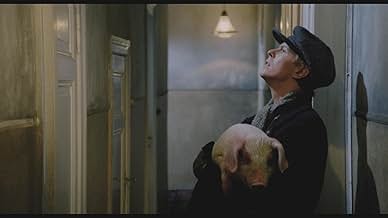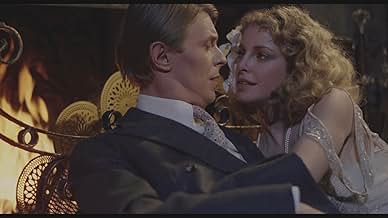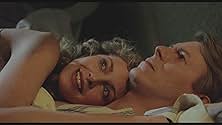VALUTAZIONE IMDb
5,5/10
1230
LA TUA VALUTAZIONE
Aggiungi una trama nella tua linguaAfter World War I, a war hero returns to Berlin to find that there's no place for him--he has no skills other than what he learned in the army, and can only find menial, low-paying jobs. He ... Leggi tuttoAfter World War I, a war hero returns to Berlin to find that there's no place for him--he has no skills other than what he learned in the army, and can only find menial, low-paying jobs. He decides to become a gigolo to lonely rich women.After World War I, a war hero returns to Berlin to find that there's no place for him--he has no skills other than what he learned in the army, and can only find menial, low-paying jobs. He decides to become a gigolo to lonely rich women.
- Regia
- Sceneggiatura
- Star
Evelyn Künneke
- Frau Aeckerle
- (as Evelyn Künnecke)
Bela Ernyey
- Von Lipzig
- (as Bela Erny)
Recensioni in evidenza
This is one of the most unusual films I have ever seen. It's an offbeat, sensitively filmed look at Weimar Germany in a sort of parallel-universe version. "Cabaret" it is not! If you ever get a chance to see it, I don't want to spoil the ending for you . . . but when you see it, you'll say to yourself, "Of course! Why didn't I foresee that coming?!?" David Bowie plays a sort of innocent ne'er-do-well discharged from the German army after World War I and drifting through existence; he can't find anything to do with himself except hire himself out as a "gigolo" for rich, proto-Eurotrash war widows in ballrooms where they "dance to forget". Bowie's father is a once-domineering tyrant who has been silenced by a stroke. Bowie tries to break the news to him that he has descended so far as to play the gigolo, a betrayal of his father's macho ideals, but Dad only sits in stony silence -- a disturbing scene. Bowie plays a poor lost soul. As Western civilization decays all around him, a sinister character stalks him and tries to gain control over him; this bloke is vaguely homosexual (only suggested), and one of his lines is a real groaner of a double-entendre: "We will have you in the end!" Marlene Dietrich is the center of romantic gravity in this story; she sadly, sweetly tells Bowie the raison d'etre of forlorn women dancing with gigolos in the ballrooms -- the only way to assuage loss and stave off despair. Then she performs the song "Just a Gigolo", bringing out all the heartbreak from its depths. The end of the film is dark and truly chilling. Go see it if you can!
When the fastidious "Lt. Paul Przygodski" (David Bowie) returns to Berlin society after the end of the Great War, he finds that things have profoundly changed and that his skills - such as they are - are not going to help him make much of a living. What he does have, though, is looks. He can easily turn an head or two when he walks into a room and so quickly realises that he can make some money "entertaining" the wealthier class of lady - already married or not, or even the occasion gentleman. As the Weimar Republic starts to give way to embryonic Naziism, the story also attempts to take a more serious track attempting to illustrate the profound societal changes in the city and the country whilst he and his clientele attempt to stay aloof and immune from the increasing anger and intolerance on the streets. It's really that attempt at the political that spoils this. Had it been left as a seedy story of a man using his beauty and, to an extent, his brains to get on in life then it have made for a decent watch. It doesn't though, it meanders all over the place mixing it's themes and delivering something that doesn't quite seem to know where it wants to go or who it's for. There's a decent enough effort from Sydne Rome as maybe the only honest woman in his life "Cilly" and there's a charming cameo from Marlene Dietrich who just about manages to, almost breathlessly, sing the title song but the rest of the cast seem underused and their characterisations undercooked to the point where I began to wonder if the likes of Kim Novak and Curd Jürgens just owed director David Hemmings a favour. It has it's moments, but just not quite enough of them and it does show up Bowie as rather wooden.
David Bowie stars this unusual melodrama set after World War I, a war hero , Army Lietenant, goes back to Berlin to find that there's no place for him, as he has no skills other than what he learned in the army, and can only find menial, low-paying jobs. He decides to become a gigolo to lonely wealthy women. As he spends most of his time working for the sexiest of ladies.
It is a mediocre film from Columbia Pictures with splendid cast that although in the technical sections: photography, music, costumes, coloring are quite good, it suffers from slowness, interference and confusion. It displays a lot of most expensive sets ever made in Germany to date, restoring some footage originally deleted by the producer Rolf Thiele, who radically reduced its 147 minutes running time after preliminary screenings. These alterations may well have helped, but no amount of tinkering could turn it into the comedy-drama that it was clearly intented to be. Its main problem is its tone, dealing with the story of a young Prussian returning to a turbulent Berlin after WWWI and finding himself torn between a number of successive lovers, homosexual Nazis, a group of gigolos and a flotilla of rich widows, but it never finds its nivel, swinging wildly between coarse knockabout farce and aspirations to tragic dignity. At the beginning there is a good recreation of the trenches during the First World War, and later there are some brief atmospheric descriptions of the German social situation during the failed Weimar Republic with the rise of the 'brownshirts' commanded by Ernst Rohm. But the film gets lost in different twists and turns in which our protagonist interacts with various women such as the dancer and singer Sydne Rome who's actually the attractive co-starring proving like never before that she is a good actress, singer and dancer; furthermore, the still charming widow Kim Novak, the gigolos-madam Marlene Dietrich, his mother played by Maria Schell who cleans the Berlin baths, among others. This film was about Berlin, shot in Berlin and financed partly by Berlin. However, none of the principal cast were from Berlin except for Marlene Dietrich in her last on-screen appearance, who was a native Berliner in self-imposed exile, in fact she shot in Paris but montage makes her seem to be in Berlin with David Bowie. Bowie's vacant acting reflects these uncertainties precisely and the cluster of star names around him are reduced to delivering awkward party pieces, these notorious players include as follows : Kim Novak, Maria Schell, David Hemmings, Maria Schell, Curd Jürgens and brief appearances from slighly known German actors, such as: Erika Pluhar, Hilde Weissner, Werner Pochath, Gunter Meisner, Reinhard Kolldehoff and 'with pride' Marlene Dietrich.
The motion picture was regularly and slowly directed by David Hemmings. This prestigious actor and directed -dead at 62- played some famous films: Alfred the Great, Blow-up, Profondo rosso, Barbarella, Camelot. And also directed some pictures with limited success. Hemmings made two Australian theatrical feature films in the early 1980s , the first was The survivor (1981) and followed by Race for the Yankee Zephyr (1981). This was last cinema movie directed by David Hemmings for around eleven years until 1992's Dark Horse (1992). Both films were made with producer Antony I. Ginnane and both movies featured an airplane as a central story element and David Hemmings replaced Richard Franklin as director. Hemmings' only other theatrical feature after that movie was 1996's Lone Justice 3 (1996). In between these pictures Hemmings did direct in television various episodes of popular TV series, such as: A Team (1983), Airwolf (1984), Magnum P. I. (1980) and Quantum Leap (1989). Rating: Average, 4.5/10. Only for David Bowie fans.
It is a mediocre film from Columbia Pictures with splendid cast that although in the technical sections: photography, music, costumes, coloring are quite good, it suffers from slowness, interference and confusion. It displays a lot of most expensive sets ever made in Germany to date, restoring some footage originally deleted by the producer Rolf Thiele, who radically reduced its 147 minutes running time after preliminary screenings. These alterations may well have helped, but no amount of tinkering could turn it into the comedy-drama that it was clearly intented to be. Its main problem is its tone, dealing with the story of a young Prussian returning to a turbulent Berlin after WWWI and finding himself torn between a number of successive lovers, homosexual Nazis, a group of gigolos and a flotilla of rich widows, but it never finds its nivel, swinging wildly between coarse knockabout farce and aspirations to tragic dignity. At the beginning there is a good recreation of the trenches during the First World War, and later there are some brief atmospheric descriptions of the German social situation during the failed Weimar Republic with the rise of the 'brownshirts' commanded by Ernst Rohm. But the film gets lost in different twists and turns in which our protagonist interacts with various women such as the dancer and singer Sydne Rome who's actually the attractive co-starring proving like never before that she is a good actress, singer and dancer; furthermore, the still charming widow Kim Novak, the gigolos-madam Marlene Dietrich, his mother played by Maria Schell who cleans the Berlin baths, among others. This film was about Berlin, shot in Berlin and financed partly by Berlin. However, none of the principal cast were from Berlin except for Marlene Dietrich in her last on-screen appearance, who was a native Berliner in self-imposed exile, in fact she shot in Paris but montage makes her seem to be in Berlin with David Bowie. Bowie's vacant acting reflects these uncertainties precisely and the cluster of star names around him are reduced to delivering awkward party pieces, these notorious players include as follows : Kim Novak, Maria Schell, David Hemmings, Maria Schell, Curd Jürgens and brief appearances from slighly known German actors, such as: Erika Pluhar, Hilde Weissner, Werner Pochath, Gunter Meisner, Reinhard Kolldehoff and 'with pride' Marlene Dietrich.
The motion picture was regularly and slowly directed by David Hemmings. This prestigious actor and directed -dead at 62- played some famous films: Alfred the Great, Blow-up, Profondo rosso, Barbarella, Camelot. And also directed some pictures with limited success. Hemmings made two Australian theatrical feature films in the early 1980s , the first was The survivor (1981) and followed by Race for the Yankee Zephyr (1981). This was last cinema movie directed by David Hemmings for around eleven years until 1992's Dark Horse (1992). Both films were made with producer Antony I. Ginnane and both movies featured an airplane as a central story element and David Hemmings replaced Richard Franklin as director. Hemmings' only other theatrical feature after that movie was 1996's Lone Justice 3 (1996). In between these pictures Hemmings did direct in television various episodes of popular TV series, such as: A Team (1983), Airwolf (1984), Magnum P. I. (1980) and Quantum Leap (1989). Rating: Average, 4.5/10. Only for David Bowie fans.
Believe it or not, this was David Bowie's first acting role in a motion picture, despite the fact that this film was released a year after THE MAN WHO FELL TO EARTH. A large portion of this film was destroyed in a fire, so it took director Hemmings nearly three years to piece together a motion picture out of what remained. With that in mind, this is a remarkable film, and one can't help but wonder what the finished product might have been like had it not been for the fire. For what is most intriguing about this film is the use of real footage of the Weimar Republic Germany in all its glorious decadence and decay. Whether this footage was used to buffer the missing footage or planned from the beginning, I guess we'll never know, but it brings an invaluable air of absurdity and black humour to what is already a pretty outrageous film. All the performances are great, especially Bowie, who really is one of the most underrated film talents out there. And the music score, which features some of the glorious songs from that era, as well as the irresistible theme song from Miss Dietrich, is fantastic! If anyone knows where I can get a copy of the soundtrack, let me know!
It is March 2005 and this extraordinary German production has just been released on DVD in Australia. The transfer is pretty good considering the problems with the original materials. In its first release it was quite successful here and is considered a Cabaret /Salon Kitty derivative. Lushly produced and with an astonishing cast fortunately for us allowing some genuine movie greats to perform and sing, JUST A GIGOLO is almost a parallel universe to the lives of Sally Bowles and Michael from Cabaret with an equally convincing and sleazy world. Bowie at times even looks like Michael York. Viewers need to be patient and let the story unfold in its awkwardly edited way. Often it seems dubbed and post produced with echoing sound effects. The musical numbers alone are worth the rental on this Gigolo. I hope it is released in your country soon. Otherwise Umbrella Entertainment from Melbourne Australia might help you. They got it from somewhere. There is a KINOWELT logo on the box too. Regarding the soundtrack, it was produced at the time and I have it on vinyl, so a vintage (!) LP store will help you. The soundtrack record is excellent as well.
Lo sapevi?
- QuizThe last on-screen appearance by Marlene Dietrich. German press reports claimed she was paid $250,000 for two days' work.
- Curiosità sui crediti"And featuring, with great pride, MARLENE DIETRICH"
- Versioni alternativeThe original European version ran a full 147 minutes. The U.S. version was cut to 105 minutes. Only this version is available on video (Water Bearer Films Video) in the United States.
- ConnessioniFeatured in Marlene (1984)
- Colonne sonoreJust a Gigolo
(Schöner Gigolo, armer Gigolo)
Music by Leonello Casucci
German lyrics by Julius Brammer
English lyrics by Irving Caesar
Sung by Marlene Dietrich
I più visti
Accedi per valutare e creare un elenco di titoli salvati per ottenere consigli personalizzati
- How long is Just a Gigolo?Powered by Alexa
Dettagli
- Tempo di esecuzione
- 2h 27min(147 min)
- Mix di suoni
- Proporzioni
- 1.66 : 1
Contribuisci a questa pagina
Suggerisci una modifica o aggiungi i contenuti mancanti





















